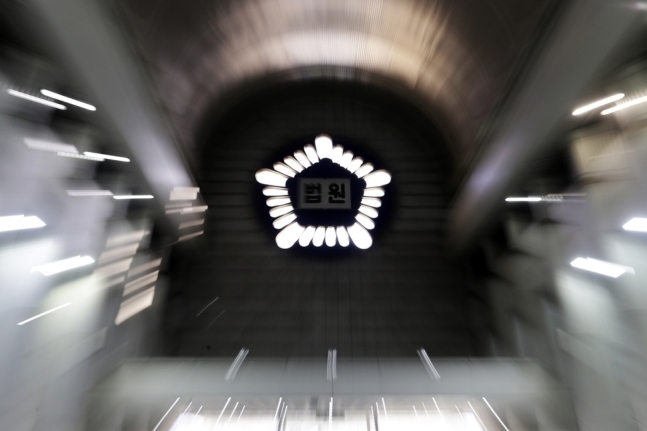Posted on : Jul.26,2018 18:17 KST
Modified on : Jul.26,2018 18:33 KST
 |
|
Seoul Central District Court (Kim Myoung-jin, staff photographer)
|
The Supreme Court has reportedly communicated what amounts to an ultimatum to prosecutors recently with its refusal to hand over documents related to the current judicial misconduct scandal.
In response to the outcry over its actions, a National Court Administration (NCA) official came forward on July 25 to claim there had been “no final notification.” But a look at the context suggests the court is not budging in its refusal to provide any more of the crucial documents prosecutors are demanding. With no results reported from recoveries of computer hard disks belonging to former Chief Justice Yang Sung-tae and former NCA director Park Byeong-dae, the investigation to find out who was behind the misconduct has run into a brick wall.
It’s enough to leave you wondering whether this is the same Supreme Court under Chief Justice Kim Myeong-su that previously made a promise to the South Korean people to get the bottom of the scandal, prevent similar misconduct from happening again, and undertake sweeping judicial reforms. If the court insists on closing ranks to cover up judicial vices, the people’s representatives in the National Assembly will need to take action.
On July 25, Seoul Central District Court senior judge Heo Gyeong-ho dismissed another request by prosecutors for a warrant to conduct search and seizure efforts on the homes and offices of Yang, Park, and former sentencing committee standing committee member and current High Court senior judge Lee Gyu-jin. Heo concluded that there were “insufficient explanatory materials on their alleged conspiracy” with former NCA vice director Im Jong-heon. A warrant request to preserve emails – already dismissed once before – so that the individuals cannot alter, damage, or delete them was similarly rejected; the only warrant issues was an additional one to search Im’s office.
After the first warrant request was rejected on July 21, prosecutors claimed to have found additional evidence, submitting thousands of files including investigation response materials from Im’s USB drive and reports on Yang and Park. Judging from reports of exit bans on the two men, the prosecutors appear to have concluded that they received at least minimal reporting on Im’s investigations of judicial officers and alleged trial “transactions.” In spite of this, warrants have been repeatedly refused – and revelations about the warrant judges’ past working relationships with them has started raising questions about why this keeps happening.
The court has also reportedly notified prosecutors that it cannot hand over all materials related to judicial policy office, judicial support office, personnel appointments, and front-line judges. Instead, it has said it will only submit materials “within the scope permitted by the relevant laws.” The South Korean public’s hope of the prosecutors’ investigation getting to the truth of the judicial misconduct scandal and leading to due measures that bring about a new judiciary are now in danger of being thwarted. It’s time for the National Assembly to take action and consider the available means of last resort permitted by the Constitution – including a parliamentary audit, an extraordinary tribunal, and the impeachment of judicial officers.
Please direct comments or questions to [english@hani.co.kr]






